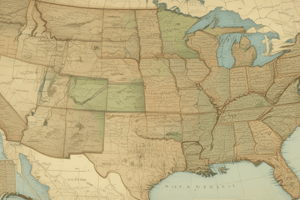Podcast
Questions and Answers
What is the primary reason that the number of congressional seats is adjusted?
What is the primary reason that the number of congressional seats is adjusted?
- Population changes as reported by the census (correct)
- Increases in economic growth rates
- Shifts in geographical boundaries of states
- Changes in political party power dynamics
Which demographic group has experienced the highest growth rate in the U.S. according to recent census data?
Which demographic group has experienced the highest growth rate in the U.S. according to recent census data?
- Foreign-born residents
- Seniors
- Non-Hispanic whites
- Hispanic or Latino population (correct)
What social implication arises from the decreasing number of non-Hispanic whites in the U.S.?
What social implication arises from the decreasing number of non-Hispanic whites in the U.S.?
- Changes in cultural leadership
- Increased political instability
- Reallocation of congressional representation (correct)
- Higher rates of poverty among minorities
What potential issue do some politicians associate with the rise in diversity due to immigration?
What potential issue do some politicians associate with the rise in diversity due to immigration?
Why is it important to consider the economic implications of census results?
Why is it important to consider the economic implications of census results?
What is the population growth rate of the United States as noted?
What is the population growth rate of the United States as noted?
Which of the following regions is specifically identified as the Rust Belt?
Which of the following regions is specifically identified as the Rust Belt?
How many million people were reported as inhabitants of the US in 2020?
How many million people were reported as inhabitants of the US in 2020?
What is the fertility rate reported for the United States?
What is the fertility rate reported for the United States?
What percentage of the US population is elderly (over 65) as stated?
What percentage of the US population is elderly (over 65) as stated?
Which of the following factors is noted as influencing inner migration in the US?
Which of the following factors is noted as influencing inner migration in the US?
What is the life expectancy reported for the US population?
What is the life expectancy reported for the US population?
Which demographic group is noted for having a significant presence in immigration to the US?
Which demographic group is noted for having a significant presence in immigration to the US?
Flashcards are hidden until you start studying
Study Notes
The US Territory
- The US is a vast and diverse country with a range of landscapes and climate zones.
- It is the third most populated country in the world.
- The US population was roughly 331 million in 2020.
- The US has a varied population distribution, with the most densely populated areas being located in the Northeast and on the West Coast.
- The Rust Belt, located in the Midwest, is characterized by industrial decline and population loss.
- The Sun Belt, located in the South and Southwest, has experienced significant population growth in recent decades.
- The country's population growth rate is approximately 0.7%.
- The fertility rate for women is relatively low at 1.77 children per woman.
- The life expectancy in the US is 79 years.
US Population Distribution
- The population of the US is highly unevenly distributed.
- Internal migration has shifted from the Northeast and Midwest to the West and South.
- Urbanization and metropolitanization is driving population shifts.
- Factors influencing internal migration include economic opportunities, lower taxes, crime rates, and housing prices.
- Immigration is a significant factor shaping US population distribution.
- Immigrants come predominantly from South America and Asia.
- Immigration is driven by economic opportunities and the appeal of the American Dream.
Population Challenges
- The US faces challenges associated with aging populations.
- There are substantial disparities in population density across different states.
- The US is also facing challenges regarding aging populations - 16% of the population is over the age of 65 - this will have implications for healthcare and social welfare systems.
- The US population is becoming more multicultural due to the effects of immigration.
Census and its Implications
- The US Census is conducted every 10 years to gather demographic information.
- The Census is mandatory and crucial for understanding population trends,
- It has social, economic and political implications.
Census Results
- The Census provides insights into population distribution, racial makeup, and other crucial demographic characteristics.
- States with larger populations have greater political power and congressional representation.
- The number of congressional seats is adjusted after each census based on population changes.
The Future of the US Population
- The non-Hispanic white population is shrinking, with increasing minority groups.
- The senior population is growing, with seniors making up approximately 16% of the US population in 2019.
- Hispanic, Asian, and Black populations are experiencing the highest growth rates.
Studying That Suits You
Use AI to generate personalized quizzes and flashcards to suit your learning preferences.




